In an increasingly interconnected world, where borders fade and markets merge, the backbone of global trade rests upon a seemingly invisible network: banks. As the conduits of financial flow, these institutions play a pivotal role in facilitating international commerce, providing crucial support that bridges gaps between disparate economies. From financing the movement of goods to mitigating risks associated with foreign transactions, banks are more than mere intermediaries; they are the architects of trade solutions that empower businesses to thrive on a global stage. This article delves into the multifaceted role of banks in shaping the landscape of global trade, exploring how they navigate challenges and innovate solutions to foster seamless economic interactions across continents. Join us as we unravel the complexities of this vital relationship and unveil the essential functions banks serve in driving global trade forward.
Exploring the Intersection of Banking and International Commerce
In today’s globalized economy, banks are not merely financial institutions; they are the backbone of international commerce. Their multifaceted roles extend far beyond traditional banking services, ensuring that transactions occur smoothly across borders. Banks facilitate currency exchange, manage cross-border financing, and offer trade finance solutions, acting as vital intermediaries between exporters and importers. By providing essential tools like letters of credit and documentary collections, they significantly mitigate the financial risks associated with international trade. This protective layer allows businesses to expand their reach and explore new markets with confidence.
Moreover, the integration of advanced technology within banking has transformed how international transactions are conducted. Digital banking platforms now offer robust solutions that enhance efficiency and transparency in trade processes. For instance, blockchain technology is increasingly being adopted by banks to streamline supply chain financing, thereby reducing the time it takes to settle transactions. Furthermore, banks are essential in offering advisory services that help businesses navigate complex regulatory landscapes, ensuring compliance and fostering trust in international dealings. As globalization evolves, the synergy between banks and international commerce will continue to fortify trade networks worldwide.
| Bank Services | Description |
|---|---|
| Letters of Credit | Guarantee payment to exporters upon meeting specified conditions. |
| Documentary Collections | Facilitate transactions by managing documents related to shipping. |
| Trade Financing | Provide loans and credit facilities to export/import businesses. |

Innovative Financial Instruments that Facilitate Global Trade
As global trade continues to evolve, traditional financial solutions are being supplemented by innovative instruments that enhance the efficiency and security of transactions across borders. One of the most compelling developments is the use of Supply Chain Financing, which allows businesses to optimize their cash flow while ensuring that suppliers receive prompt payments. This approach not only mitigates risks associated with foreign exchange fluctuations but also fosters stronger relationships between buyers and suppliers. Moreover, Blockchain Technology is making significant strides in increasing transparency and traceability in trade finance, reducing fraud, and speeding up transaction times. The decentralized nature of blockchain ensures that all parties have access to the same information, which can drastically cut down on disputes and enhance trust among trade partners.
Another novel approach gaining traction is the Certificate of Deposit (CD) for Trade Financing, where banks issue short-term certificates linked directly to international transactions. These instruments provide a safe investment avenue while serving as a reliable assurance for exporters, securing their financial interests. Additionally, banks are now leveraging Digital Currencies for cross-border payments, enabling faster transactions with lower fees compared to traditional methods. This shift not only simplifies the remittance process but also serves to facilitate trade between businesses and economies that may have previously lacked access to efficient banking systems. Through these innovative financial instruments, banks play a pivotal role in bridging the gaps in global trade, ensuring that businesses can operate seamlessly and securely no matter where they are located.

Strengthening Supply Chains through Financial Services
In an increasingly interconnected global market, financial services serve as a critical backbone for enhancing the resilience and efficiency of supply chains. Banks and financial institutions can offer tailored solutions that not only facilitate transactions but also provide the necessary capital to stimulate trade activities. Among the various support mechanisms, banks can deliver trade financing options, currency risk management, and credit insurance, each playing a pivotal role in ensuring smooth operations across borders. By offering flexible financing solutions, banks enable businesses to manage their cash flow more effectively, bridging the gap between vendors and consumers. This ensures that products move swiftly from production to consumption, reducing lead times and enhancing customer satisfaction.
Moreover, the collaboration between diverse stakeholders within the supply chain can be greatly amplified through the strategic use of technology-driven financial solutions. Banks can leverage platforms that enable digital payments, real-time tracking of shipments, and automated invoicing, reducing inefficiencies that often plague traditional systems. Effective financial oversight and reporting, alongside early risk detection systems offered by banks, create a transparent environment conducive to cooperation and trust among supply chain partners. In essence, the synergy between financial services and supply chain management enhances competitiveness while cultivating an ecosystem that fosters innovation, adaptability, and sustainability in global trade.

Recommendations for Enhancing Bank Engagement in Global Markets
To optimize bank engagement in global markets, financial institutions must embrace innovative technologies and enhance their service offerings. Incorporating blockchain technology into transaction processes can significantly increase transparency and reduce the time it takes to clear international payments. Additionally, banks should consider offering tailored financial solutions that cater to the distinct needs of SMEs seeking to enter new markets. These solutions might include:
- Cross-border financing options aimed at reducing barriers to entry for emerging businesses.
- Risk management tools that help mitigate currency fluctuations and other uncertainties.
- Dedicated trade advisory services to guide companies through the complexities of global compliance and regulations.
Furthermore, banks should actively collaborate with fintech startups and other stakeholders in the trade ecosystem to foster a more integrated approach to global commerce. Establishing strategic partnerships can lead not only to enhanced service delivery but also to an enriched customer experience. Here’s a simple overview of potential collaborative strategies:
| Strategy | Description |
|---|---|
| Joint Ventures | Partnering with fintech for innovative product offerings. |
| Information Sharing | Collaboratively sharing market insights and analytics. |
| Co-creation of Solutions | Working together to develop new trading platforms. |
In Summary
As we draw the curtain on our exploration of the vital role banks play in global trade solutions, it becomes clear that these financial institutions serve as the connective tissue of the international market. By facilitating transactions, mitigating risks, and providing invaluable services, banks are not just passive observers but active participants in the complex web of global commerce. They bridge the gaps that can often seem insurmountable, fostering connections between diverse economies and cultures.
In a world where trade barriers are continually evolving, and the landscape of commerce is ever-changing, the adaptability of banks will be crucial in shaping future trade environments. Their capacity to innovate—through technology, financing options, and strategic partnerships—ensures they remain at the forefront of facilitating smoother commerce across borders.
As we look ahead, the symbiotic relationship between banks and global trade will undoubtedly continue to evolve, presenting both challenges and opportunities. The commitment to creating robust, inclusive financial ecosystems will be instrumental in addressing the needs of a rapidly developing world. Thus, as key players in this equation, banks not only influence the flow of goods and services but also contribute to a more interconnected and prosperous global economy.
